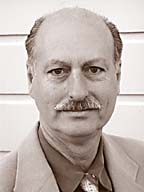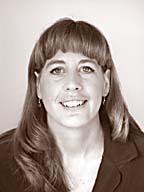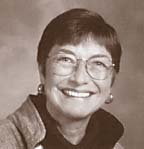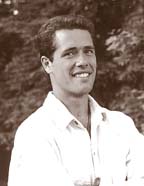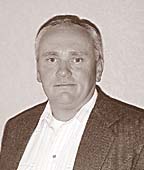|
5th District race No holds barred by GEOFF S. FEIN by ANDREW EDWARDS
IN RECENT YEARS, THE RACE for the Humboldt County Board of Supervisors 5th District seat has been close. Four years ago, less than 100 votes separated the victor, Paul Kirk, from his opponent, Sara Senger. In the March 2002 primary, Jill Geist bested Ben Shepherd by a mere 51 votes. In the final weeks before the Nov. 5 election, Geist and Shepherd have stepped up their efforts, filling their campaign war chests, making numerous appearances, knocking on doors and pointing out each other's flaws. The issues in the 5th District include economic development, land use, the environment, and how to deliver county services -- such as health and public safety -- to people in the far reaches of the 5th District: Orleans, Orick, Weitchpec, Hoopa and Willow Creek.
"So McKinleyville is the dominant force in the district," Shepherd said. "But every community has its own issues." [Left, Jill Geist, at right Ben Shepherd] In the March primary, there were six candidates in the race, almost all of whom (with the exception of Mike Harvey) have come out for Geist. Geist has also been endorsed by Assemblywoman Virginia Strom-Martin; District Attorney-elect Paul Gallegos; former state Assemblyman and current Arcata City Manager Dan Hauser; Adelene Jones, mayor of Blue Lake; and Bryce Kinney, former mayor of Trinidad. Shepherd has been endorsed by current 5th District Supervisor Paul Kirk and Sheriff Gary Philps. Geist said she wasn't surprised that Kirk and Philps endorsed Shepherd. Philps contributed to Shepherd's primary campaign. Kirk's endorsement is all part of the same political machine that elected Anna Sparks to the Board of Supervisors, Geist said. (Sparks served from 1986-98.) "It's part of the political reality," Geist said. This is Geist's first foray into county politics. It's Shepherd's third attempt at winning a seat on the Humboldt County Board of Supervisors. Geist works for the city of Arcata as an environmental compliance analyst. She has been on unpaid leave from her job since August to campaign. Shepherd is a retired school teacher. Some feel the election could be a turning point. A victory by Shepherd, the thinking goes, would maintain the political status quo on the five-member board. Given that Shepherd has received $3,000 in campaign contributions from Simpson Timber Co., the belief is that if Shepherd is elected the board would continue to be timber-friendly. A victory by Geist, on the other hand, would tilt the board to the left, making it more pro-environment and willing to take on timber interests -- that's the theory, at any rate. First District Supervisor Jimmy Smith isn't buying it. "I'm disappointed when I hear that [Geist's election] will shift the balance. This board works together as a team, not as a politically divided group." Negative campaigns?Geist and Shepherd have accused each other of running shadow campaigns aimed at discrediting their opponent. Both have denied the accusations. Late in the summer, one of Shepherd's supporters tried, unsuccessfully, to get Geist's personnel file from the city of Arcata. At issue was whether Geist was attending the regular Tuesday Board of Supervisors' meetings on her own time or as an employee of the city. Geist said it was on her own time. The action triggered a barrage of letters to local newspapers from Geist supporters. Shepherd said it was a legitimate question to ask Arcata city officials. He said calling that negative campaigning is a gross overreaction. "I'm shocked at the response to it [from Geist's supporters]," Shepherd said. Shepherd has tried to show he is not running a negative campaign. He's maintained he's running for the 5th District seat and not against Geist. But Shepherd began running radio advertisements earlier this month not only pointing out the differences between himself and Geist, but making certain that listeners and potential voters knew that Geist works for the city of Arcata and is supported by many Arcata activists. Shepherd said his strategy was due to Geist's actions. "We've been under a fairly significant onslaught from Jill," Shepherd said. "My supporters were concerned." What they were concerned about were the number of letters to the editor appearing in almost every newspaper between Eureka and Orick. Geist said there's no orchestrated letter-writing campaign. "I told my group I don't want any negative letters written," she said. But Shepherd's radio ads have openly called into question Geist's experience. "We don't really know that much about his [Shepherd's] opponent. All we know is she is Arcata's environmental compliance analyst, and that she's being backed by Arcata activist types," the female voice says. A male voice then questions Geist's background. "But she's got no business experience, or much of any other kind as far as we can tell," the male actor says. Shepherd said the ad is fair because he has business experience while Geist doesn't. To demonstrate Geist's Arcata links, Shepherd points out that some of his supporters have received pro-Geist polling calls originating from Evergreen Wireless in Arcata. Shepherd wants to know why Geist hasn't used a business located in the 5th District. The fact she is using an Arcata company shows that her Arcata connection is true, Shepherd said. Geist doesn't hide the fact she has an Arcata connection; after all, she works for the city and knows a number of people in Arcata. As for Evergreen Wireless, Geist said two companies in McKinleyville did offer their services, but neither had enough phone lines. Geist isn't surprised by Shepherd's approach about her Arcata backers. "It's an old tactic used in the 5th District to create fear," Geist said about her Arcata connection. "I have a far greater number of supporters who are 5th District activists." Geist's supporters, for their part, say Shepherd is intolerant and difficult to work with. Similar but different backgroundsEven the backgrounds of the two candidates have sparked some controversy. Geist said she and Shepherd have some commonalties. Both served on the McKinleyville Community Services District; the Citizen Advisory Committee working on McKinleyville's general plan; and on the Redwood Region Economic Development Commission (RREDC). Shepherd, however, stressed that there are significant differences between the two. He was a school teacher in Trinidad for 32 years and for four years ran North Coast Almanacs, an economic and demographic analysis service. Shepherd said running his own business and having worked with his wife, Wendy Wahlund, owner of A&L Feed Garden and Pet Supply in McKinleyville, for 10 years, shows he has more business experience. "I felt it was important to differentiate ourselves," he said. Shepherd sold North Coast Almanacs in 2001 so that he could devote his time to running in the March primary, he said. Shepherd's 19-year tenure (from 1980 to 1999) on RREDC's executive committee, which provides loans to businesses countywide, has emerged as an issue in the campaign. Geist, who never served on the executive committee, has pointed to some loans that went bad in the 1980s as a way to raise questions about Shepherd's fiscal wisdom. Shepherd, in return, has said Geist is using his experience on the commission to unjustly portray him as fiscally irresponsible. From its beginnings in the late 1970s, RREDC was making most of its loans to timber-related businesses. Between 1980 and 1984, five recipients defaulted on loans that totaled about $1.1 million. Because RREDC lost almost one-third of its portfolio, it drastically cut back on loans. For most of the 1980s, RREDC made fewer than six loans per year. While Shepherd was on the executive committee overseeing many of those loans, including those that went bad, he was only one of five board members (the board grew from five to six members in 1983). Besides being Arcata's environmental compliance analyst, Geist currently serves on the California Water Environment Association North Coast Section, Humboldt Bay Shellfish Technical Advisory Committee and the North Coast Pollution Prevention Committee. She has also served on the board of the Redwood National Park Association. "From a regional and state perspective I have more experience than him, hands down," she said -- implying that her experience relates more closely to the kinds of issues that come before the supervisors. Geist and Shepherd also differ on the use of funds from the Campaign Against Marijuana Production, or CAMP. CAMP is a state-run marijuana eradication program that only operates eight to 12 weeks, from late July to early October, during the marijuana harvest season. In a recent interview, Geist said the CAMP program needs to be modified. There are many Southern Humboldt County residents who are not growing marijuana who have been harassed by law enforcement efforts, specifically by helicopter surveillance flyovers, she said. "I'm not against [CAMP]. [Residents'] concerns need to be addressed," she said. "The Board of Supervisors needs to assure the well-being of residents. That's not anti-CAMP." In fact, Geist would like to see the CAMP program expanded to focus on methamphetamine production and the rise in heroin use in Humboldt County. "This is about more than marijuana," she said. "It frustrates me when it's just focused on marijuana." Another aspect of the debate is the Marijuana Suppression Grant, which is significantly different from CAMP, according to Shepherd. The grant is a state and federally funded program that combats marijuana production year-round. The Marijuana Suppression Grant provides the county with about $320,000 in state funds for a sheriff's sergeant, two deputies as well as staff for the District Attorney's office, and equipment and vehicles. The deputies paid for through the grant provide more than marijuana suppression to the county, Shepherd said. Without the grant, the overall level of law enforcement in the county would be reduced, Shepherd said. Both CAMP and the Marijuana Suppression Grant focus on commercial growers and not on those using marijuana for medical purposes, Shepherd added. Another difference is how much money each has raised. Since the beginning of the year, Shepherd has raised $43,802 and spent $55,951 (both figures include the primary campaign). Geist has raised $34,706 and spent $33,773 for the same period (figures also include the primary). Shepherd's largest donors have been Sierra Pacific Industries, $1,500; Simpson Timber Co., $3,000; JLF Construction, $1,150 and Contri Construction, $2,000. Geist's largest donors have been Anne Pierson (owner of McKinleyville Shopping Center); $1,145; Sylvia Garlick (Ming Tree Realty), $620; Victor Taylor (Humboldt County Mental Health Dept.), $600; Operating Engineers - Local 3, Alameda Calif., $1,000; Becky Kent (retired), $600. Geist and Shepherd have been regularly attending the Board of Supervisor meetings to familiarize themselves with the issues and how the supervisors conduct business. 5th district ignoredGeist said there is a growing dissatisfaction among 5th District residents about how things have gone in their district. For example, economic development. Much of the county's efforts at economic development have focused on Humboldt Bay. Even though McKinleyville boasts dozens of retail businesses (such as Kmart) along Central Avenue, the 5th District's largest employer is the Blue Lake Casino, Geist said. Because of the lack of attention paid to the district there is a high degree of apathy among 5th District voters, Geist said. "The people want someone who is responsive, fair and who'll listen and work to respond," she said. "People want representation." During tough budget years, the county should be looking to partner with non-profits to better serve residents, especially those in the far corners of the 5th and 2nd districts, Geist said. Orleans, with a population of 600, has a tribal health clinic that is open to everyone. People need to be made aware that there are services out there, she added. One issue unique to the 5th District is water flow along the Trinity and Klamath rivers -- both of which are partially diverted to irrigators. Geist said the supervisors need to tap into Proposition 13 funds -- restoration and conservation money -- to get someone on the county staff to track river issues. Sutter and Butte counties have already done this, Geist added. Timber's not deadAn important issue to Geist is the preservation of open space, ranch and agricultural lands. Because Humboldt County and in particular the largely rural 5th District have the quality of life that people in the San Francisco Bay Area want, Geist sees the northern part of Humboldt County undergoing phenomenal population growth. McKinleyville, for example, is already growing at approximately 2.3 percent per year, almost twice the rate of the county as a whole. Both Geist and Shepherd agree that the rural communities in the 5th District are hurting economically. Shepherd said the reduction in timber jobs has caused "extreme hardship in the rural areas." But Shepherd added that the public's perception that the timber industry is dead is not true. "Timber will always be a major part of our economy," he said. "A healthy timber industry is extremely important to us." Shepherd said his top priorities have been law enforcement, roads and to promote responsible economic development. Shepherd would like to see the railroad up and running. Lower shipping costs would lure businesses to the area, he said. Another example of the impacts on rural areas within the 5th District, Shepherd said, is what has happened in Orick, which is surrounded by Redwood National Park. "(Orick residents) have seen a loss of natural resources and they are concerned about that," he said. There is a belief "that the National Park Service is not always sensitive to local concerns." Shepherd did not cite any specifics to alleviate Orick's predicament. Willow Creek has seen a significant shift in its economy. Once a timber town, Willow Creek is now becoming a tourist town, Shepherd said. (Rural) areas are searching for something to replace the job loss," he said. "Every community needs to have a real specific say in what they are going to be." Shepherd is also concerned with the rising cost of housing. Part of that increase is due to the time it takes to build subdivisions and the cost of permits, he said. Time will tellIt is perhaps understandable that Shepherd and Geist have resorted to jabbing each other -- when a race is close, the temptation to sling mud can be irresistible. Humboldt voters will soon determine which one prevails -- and then it will be up to the victor and the other supervisors to set policies for the county. Only then will it become clear whether this fiercely contested election was truly pivotal. THE RACE TO REPRESENT THE 1ST DISTRICT IN THE STATE ASSEMBLY HAS become one of the most hotly contested political contests in the Humboldt area. Newspapers have been flooded with letters from supporters of all three candidates: Doug Thron, Green Party; Rob Brown, Republican; Patty Berg, Democrat. And the campaign has taken on a negative tone as both Thron and Brown have teamed up to attack Berg over her sizeable campaign donations
All three are vying for the Assembly seat currently held by Democrat Virginia Strom-Martin, who is leaving after six years in office because of term limits. Strom-Martin has endorsed Berg.
[Above left, Patty Berg, left, Rob Brown and, at right, Doug Thron] The five-county 1st District is the third-largest assembly district in California. The district, which contains widely scattered small cities, runs from the California-Oregon border south to near Santa Rosa. Next year Trinity County will join the 1st District, making it even more of a challenge to represent. It can take more than six hours to travel the entire length of the 1st District, Berg said. And the issues are as diverse as the people: for example, in Sonoma County, traffic and affordable housing are huge issues, but not unemployment (the unemployment rate in Sonoma County is just above 3 percent, according to Berg). In Lake County, drugs, the economy and the health of Clear Lake are primary concerns. In Humboldt County, water quality and quantity, along with infrastructure shortcomings, loom large. According to Brown, even though the 1st District leans heavily toward Democrats, about 25 percent of the voters don't belong to either the Republican or Democratic parties. Big moneyThis year's race has been a boisterous one. Allegations of political pandering, hypocrisy and false accusations have been tossed about freely. Thron has claimed that Berg, who has taken contributions from large corporations and political action committees (PACs), will owe favors to powerful interests should she win. There is no denying that Berg has raised thousands of dollars more than Brown and Thron combined. It is also not in dispute that much of the money has come from outside the first Assembly district. Thron has referred to the contributions as "legalized bribery." As of Oct. 19, Berg had received approximately $420,600 in contributions and spent $367,000; Brown had raised approximately $106,000 and spent about $105,000; Thron's last filing was made in July, according to the Secretary of State's office. For that filing period, Thron had raised $10,764 and spent $600. Berg's largest contributors (as of the July filing deadline) are The Women's Political Committee, Los Angeles, $6,000; The California State Council of Service Employees, Sacramento, $12,000; California Real Estate Political Action Committee, Los Angeles, $6,000; Cher-Ae Heights Indian Community of the Trinidad Rancheria, $2,000. Brown's largest contributions (for the same time period) came from: the American Contractors Indemnity, Los Angeles, $4,000; Harvey Harper, (car dealership owner), $500; Rogan Coombs (executive with Timber Inc.), $500; and Joseph Russ IV (rancher), $500. Thron was the largest contributor to his own campaign, loaning himself $9,450. Strom-Martin said she spent over $1 million in her first run for the Assembly. She said there's nothing wrong with taking money from special interests like labor or teacher PACs. Strom-Martin also stressed that you need money to purchase media advertisements to cover such a huge district. "So when someone offers you $10,000 from outside the district are you going to say `no?' Of course not." A strange pairingAt the televised Humboldt County League of Women Voters debate on Oct. 14, both Thron and Brown teamed up to attack Berg. The Greens and Republicans may seem a strange pairing, but not when many consider Berg a shoo-in. It wasn't the first time Brown and Thron worked in concert. Earlier in the month, the Brown campaign asked 300 voters which candidate they agreed with on the issues, and found that more agreed with Thron than with Berg -- by a margin of 10 percent. Brown personally called Thron to inform him, and it wasn't long before Thron supporters were talking in public about the poll. That Brown would produce such a poll shouldn't be too surprising -- his only hope of winning, after all, is if Thron takes a substantial number of voters from Berg. Thron, for his part, has been unrelenting in his attacks on Berg for taking at least $5,000 in contributions from insurance, timber, oil and prison interests. At one point in the campaign, Brown alleged that Berg failed to pay taxes on her property. Brown later withdrew the allegation when it turned out another Patty Berg was the culprit. Berg's campaign has not been above wallowing in negative muck. Her supporters have pointed out the contradictions in Thron's Green Party campaign -- he favors land preservation yet had a billboard advertisement in a protected wetlands area; he drives a new Corvette but claims he's running a grass-roots campaign; he calls himself an environmentalist, yet he looks like a rancher because he sometimes sports a cowboy hat and boots. Berg's campaign even alleges that Thron will not disclose what corporate contributions he has turned down -- as if it matters whose money he doesn't take. Thron maintained that the location of his billboard ad (it was off southbound Highway 101 just north of Eureka) was not his decision. The billboard company lied to him about the sign being in the wetlands, Thron claimed. After several weeks of being chastised about it, Thron demanded and finally got the company to relocate his ad further north on Highway 101 toward Arcata. Thron, who acknowledged being thrown off-guard by the attack on his billboard ad, said he has been consistent with his message and that the real issue of the campaign is the vast amount of money Berg has received from special interests. That's business as usual, Thron said -- politicians having to pay back political debts has prevented Californians from getting affordable health care; has led to destruction of the state's natural environment; and has kept many people away from the voting booth and away from becoming actively involved in politics. "Politicians talk of fighting for this or that, but it doesn't happen," said Thron, who recently called for banning all campaign donations from PACs and special interest groups. Berg has taken thousands of dollars from industries that conflict with what Californians want, Thron charged. For 30 years the Democrats have been in charge in Sacramento and things have not improved for most Californians, Thron said. "If Patty (Berg) gets elected it won't change (anything)," he said. "She's indebted to special interests." Thron said he is endorsed by consumer attorney and former Green Party presidential candidate Ralph Nader and documentary filmmaker and author Michael Moore. Thron is running on the same message Nader used in 2000 when Nader ran against then-Vice President Al Gore and Texas Gov. George Bush; the Democrats and Republicans have more in common with each other and are beholden to special interests at the expense of workers, the middle class and the poor. Just as Nader pointed out the flaws with both Gore and Bush, Thron has run a similar campaign against Brown and Berg. But Thron's efforts appear more focused on Berg. And just as many Democrats believe that Nader cost Gore the 2000 presidential election, some on the North Coast fear that Thron could hurt Berg's chances, leading to a possible victory for Brown. Thron said he has seen published letters questioning his decision to campaign fiercely against Berg, but no one has come up to him personally to voice displeasure. In fact, Thron said he has received a lot of support. "People are concerned about corruption in government. People are really concerned about (California)," he said. Although Thron acknowledged that it will be tough to overcome Berg's campaign finances and the strength of the Democratic Party in the 1st District, he said he can pull it off. "I think people will let their vote be known," he said." The (Green) Party faithful know I'll be successful." Thron helping Brown?Having Thron continually attacking Berg could benefit Brown. That's what Brown hopes, at least. Brown said Thron could get close to 20 percent of the vote. That would be enough to enable Republicans to finally wrest the seat away from the Democrats, who have held a grip on the 1st District for more than three decades. "I understand the impact of Doug (Thron) in the race," Brown said. "Patty (Berg) has proven herself to be a campaign bought by big business." Brown said Berg's ability to garner donations from PACs and industries will make it impossible for her to be an independent voice for people in the 1st District. "Money buys you access," he said. "The people who'll have access [to me] will be from Orick, McKinleyville and Lake County." Brown is true to the Republican Party's theme of less government. He believes government has no business being involved in economic development; that the free market system works the best; that government should stay out of regulating the health care industry; and that the government should not infringe on an individual's right to own a gun. He said the state is too compassionate with the prison population and expressed support for capital punishment. Brown has even called for expanding the death penalty to include child abductions by strangers. Even though he supports the Republican Party's platform, Brown said he is not a poster child of the California GOP. Even if he were to win, the Democrats would still have a significant lead over Republicans in the Assembly. Right now there are 50 Democrats and 30 Republicans in the state assembly. Brown said there were several issues that led him to run for the Assembly. The state's $24 billion deficit was a concern. As was the high number of bond issues, which Brown fears could increase the debt for future generations. He also expressed dissatisfaction over the impact of decisions made in Sacramento on the 1st District. "There is more done to us than for us," he said. One area Brown would like to take on should he win the Assembly seat is eliminating what he calls "ghost jobs" -- seats on state-level boards and commissions that often are filled out of political favors. "No one will miss a job not filled," Brown said. Brown, who considers himself a conservationist, said the state needs to give more control to local authorities to deal with the river flows in the Klamath, Trinity and Eel rivers. Brown, who served on the Lake County School Board, said he'd like to increase pay for teachers. He'd also like to offer scholarships to students interested in pursuing careers in teaching. At times Brown sounds more like a Libertarian than a Republican. For example, Brown said if people in California vote to legalize marijuana, then the federal government should stay out. But Proposition 215, which permits medicinal use of marijuana, was wrong, Brown said. "What the state did was wrong. There is no clear definition [of the law] on this," he said. Punching bagIt has to be tough being Berg. At forums she has had to defend herself against attacks from opponents on two different political sides. She's afraid the negative tone of the campaign could lead to a low turnout on election day. "I'm saddened by the negative turn this race has taken," Berg said. "People have had enough [negative campaigning]. They want to hear about the issues." Berg doesn't avoid talking about the amount of money she has raised. She said more than 400 different groups have contributed to her campaign and those groups represent thousands of individuals. She rejects the notion that she will be beholden to any group and says she's trying to focus on the issues. Berg has spoken with teachers and administrators to formulate her stands on education; she has talked with nurses, doctors and executives in the medical community to formulate her views on health care. Berg said she is opposed to raising taxes to offset the state's budget deficit, but that the state must continue to fund programs such as those for health care and child care. "It's important we don't cut vital programs," she said. Berg allowed there may be overlapping of state services but that that could present an opportunity to streamline and save some more budget dollars. To help determine where repetition is occurring, Berg wants periodic reports made available to legislators to allow them to either modify or eliminate some programs. On educational matters, Berg would like to see more certified teachers in the classroom. And she questioned the need to spend $68 million to administer the state's standardized test (STAR) on an annual basis to almost every elementary, junior high and high school student in the state. The water issue along the Klamath and Trinity and Eel rivers is very complicated, Berg said. The Klamath River is poorly managed, Berg said. And she is for removing the dam that is part of the Potter Valley Project, diverting water from the Eel River to the Russian River for the communities of Healdsburg, Cloverdale and Ukiah. "We want the rivers to flourish," Berg said. "But we have to be mindful of the communities that use the water." At the same time, she said that the priority in the rivers are the fish and that the water is not owned by anyone. "We in the north pay a heavy price for water," she said. "[About] 80 percent of our water goes to agriculture. I guess what we are doing is subsidizing cotton and rice in the Central Valley." (While the Trinity River is diverted to the Sacramento and San Joaquin valleys, the Klamath, which has its headwaters in the Cascades, is sent to farmers in southern Oregon). After months of enduring attacks from her opponents, the bottom line is that Berg is making no apologies. "My opponents can run their campaign as they so choose. I'll stick to the issues," she said. "I know what I'm doing. I'm not a novice." To be a Victorian mayorIn Ferndale's system the mayor is elected separately, but in fact is just another council member -- albeit one with the responsibility of representing the "Victorian Village" to the world. Challenging incumbent Mayor Jeff Farley is current City Councilmember Frank Taubitz. Jeff Farley, 49, (incumbent). Farley is a lifelong Ferndale resident. He runs Farley Milk Transport, a company his grandfather, Ambrose Farley, founded with a horse and wagon after coming home from World War I in 1919. He has been mayor of Ferndale for the last two years, and says that under his leadership communication in the city has improved. "I think we've been able to support and work with our business district a lot better [during my term of office]," Farley said, speaking by phone from his home. He sees his major strength as his experience, both with the community and with the city's government. He cited his 16 years of experience on the Ferndale Planning Commission (four as chairman), his work experience, the fact that he is familiar with water treatment issues and his tenure as mayor. "I just know the local people," Farley said. "I always make myself available for phone calls, and call right back. I never hesitate to give out my number." His goals, if elected, would be to continue working on the water treatment problems in Ferndale, continue the mandatory update of Ferndale's general plan and maintain Ferndale's Victorian ambience by stopping urban sprawl before it starts. "That's what makes Ferndale so unique," Farley said. "[I want] to keep it the way it is." Frank Taubitz, 60, Ferndale City Council member. Taubitz is retired and has lived in Ferndale for seven years. "When I retired my wife and I asked ourselves `where do we go every time we get the chance?' The answer was the Ferndale/Petrolia area," Taubitz said. "We've been coming up here for years." He said that what really sets him apart is his managerial experience. When he retired in 1995 he was the administrative officer at a naval shipyard that repaired submarines -- a position that earned him a Meritorious Civilian Service Medal from the Navy. Taubitz said a vote for him is a vote for the future. Since Ferndale has hired a city manager, taking the load of everyday city business off the backs of the City Council, he feels that the Council should start working on more long-term goals. "I think the city needs to define where its economic growth is going to be in two to five to 10 years," Taubitz said. One of his ideas is to establish a "blue-ribbon" committee of long-time residents and members of the professional community to brainstorm on the course the city should take. He thinks the goal should be to preserve the town's special charm. "You want to keep Ferndale as unique as you possibly can, preserve the visual image of Ferndale and preserve its laid-back and friendly personality," Taubitz said. As mayor Taubitz would be a facilitator and an ambassador representing the will of the city, rather than his own opinions. Taubitz and Mayor Farley have disagreed on several occasions. Taubitz said that if you disagree with someone in office you should do something about it. So he did. Four for Ferndale CouncilIt wouldn't seem that Ferndale, with only 904 registered voters, would be a hotbed of political intrigue. But there's plenty of tension underneath the town's charming Victorian facade, as farmers struggle with artists and retailers over issues ranging from gravel pits to public toilets. Four candidates are running for two seats on the five-member City Council in the Nov. 5 election. The top two vote-getters will get in if Mayor Jeff Farley defeats his lone challenger, Councilmember Frank Taubitz (see page 7 story). If Farley loses and Taubitz becomes mayor, the three top vote-getters in the Council race would be winners as Taubitz' council seat would need to be filled. James Moore, 56 (incumbent). "I'm familiar with the dairy industry and I'm an artist," Moore said in a phone interview. "[So] I think I can mediate between [the two sides]. I try and listen to both sides and bring them to consensus." His goals for another term include continuing cooperation with Michael Palmer, Ferndale's new city manager; working to preserve the town's watershed and farmlands; improving Ferndale's drainage and its roads; and upgrading the sewage plant. "I try to listen to both sides, I try to work in the middle," Moore said. "Let's get down to issues and solve problems instead of [getting] polarizing [by] them. Todd Sanborn, 35. His goals if elected would be to take care of the city's budget and upgrade the sewer system. "We need to get it up to a legally decent system, so we're not running into problems every time we get rain," Sanborn said. His main goal is economic growth. "I think as a council we need to really look at trying to see what we can do to grow the city, not necessarily in numbers and people, but in a marketing approach," Sanborn said. "[We need] to get tourists into [Ferndale], people who are going to spend money." He describes himself as a conservative Republican who is "pro-business and pro-growth," though not irrational growth. "Government at its best is run like a business," Sanborn said. Rachel J. Harrison, 22. Her signature issues are traffic safety -- she wants more stop signs and speed bumps; Ferndale's youth -- she wants one of the many halls around town used as a rec center for kids; and low-cost housing. "[If the current trends in housing prices continue] there will be nothing for the kids coming back from college," Harrison said. Her main focus as a coucil member would be to listen to the people of Ferndale and represent their views. "I believe in government by the people for the people," Harrison said. "When I was going door-to-door people would ask me what my platform was. I'd tell them going door-to-door I was getting my platform." Harrison is a Republican, though she "adores" Democratic Congressman Mike Thompson. She says she's always wanted to be a politician and that this race is just the first step. "Someone said, `If you lose don't worry about it, you can run again when you're 40,'" Harrison said. "Forty? I'll be running for state senate by the time I'm 40." Carlos Benemann, 60, former mayor of Ferndale. He said he did not have time to be interviewed for this article. The following information is based on a report that recently appeared in The Ferndale Enterprise. He said he's running because he sincerely enjoys public service, and that he finds the work of solving community problems a satisfying challenge, intellectually. He favors a business tax hike, doesn't like the proposed gravel quarry deal and thinks that the city manager position is of great benefit to the city. Sound fiscal responsibility is a priority for Benemann. He wants to streamline city staff. And he wants to make sure that the city isn't stuck with a financial obligation it can't handle once a $100,000 COPS grant from the state for its police department runs out.
A fifth candidate, Jonathan Zaugg Jr., moved to Fortuna in the midst of the campaign and dropped out of the race. IN THE NEWS | FROM THE PUBLISHER | CALENDAR
Comments? E-mail the Journal: [email protected] © Copyright 2002, North Coast Journal, Inc. |


